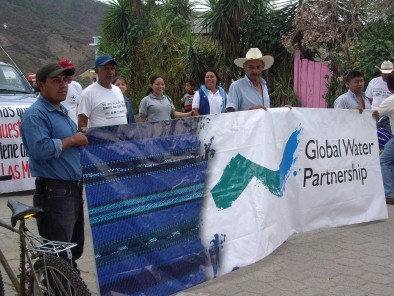2013 has been designated the United Nations (UN) International Year of Water Cooperation. On March 22nd, the UN World Water Day, the Global Water Partnership (GWP) celebrates the success of cooperation as a model for the equitable and sustainable management of water resources worldwide, and its potential to aid conflict resolution.
Lack of access to freshwater is a growing global concern that threatens the livelihood of millions of people, especially the poor. Access to water for drinking, sanitation, agriculture and industry, underpins economic and social development. With the human population predicted to reach nine billion by 2050, we need to find ways to ensure that the finite and increasingly stretched global water supply is conserved and shared equitably. Failure to do so could result in conflict over access to this vital resource.
“Collectively, GWP Partners and allies are promoters of change: changing the way we manage water,” says GWP Chair Dr Ursula Schaefer-Preuss. “To do that means turning non-cooperation on water into cooperation on water.”
Since its establishment in 1996, GWP, an international network of organisations working on water-related issues, has spearheaded co-operation initiatives to bring together individuals, communities, institutions and governments to tackle complex challenges of water resources management, sanitation and pollution in water-stressed areas across the globe. GWP provides a neutral space for stakeholders to share ideas and solve problems. It also provides mechanisms for co-operation, and enables the sharing of knowledge and skills between communities and countries to adapt, and implement successful water management solutions.
“Where there has been potential for conflict and breakdown of communication, the Global Water Partnership's approach has helped to foster understanding and collaboration,” says Dr. Ania Grobicki, Executive Secretary of GWP. “Changing the way water is managed takes time and requires long term commitments and contributions by all the parties. Now we are calling on governments and institutions to make available resources to scale up cooperation initiatives in areas where limited water supplies must meet the needs of multiple interests.”
“We have seen cultural and language barriers dissolve as people are given the space and time to listen and be listened to”, continues Dr Grobicki. “Political tensions can be diffused when communications channels between individuals improve, and this can filter up to higher levels of authority and government. So cooperation to manage shared water resources can also contribute more widely to peaceful and effective relationships between communities, institutions and countries.”
Ensuring that the planet can meet the water needs of future generations is a daunting challenge, and cooperation is not only possible, GWP argues, but it is the only way to achieve a future in which there is enough water for all.
Some examples of successful outcomes of co-operation over shared water resources:
- In Botswana's Okavango Delta, GWP facilitated cross-sectoral collaborations to devise an integrated approach to protect this economically and ecologically important region. Guidelines were drawn up leading to a legal framework to prevent the spread of waterborne diseases, safeguard the tourism industry, and ensure the provision of water for farming, wildlife and communities. The model has since been applied across the country.
- GWP advised on the implementation of an Integrated Water Resource Management (IWRM) strategy for a river basin in the Peruvian Andes, which serves many communities, and is threatened by environmental degradation and exploitation. GWP provided impartial information and a neutral space, enabling grass roots collaborations to emerge, and devise ways to safeguard the services and resources that the river basin provides.
Media contact:
For case studies, images and interviews please contact:
Steven Downey, Head of Communications, Tel. +46 (0)8 1213 8640,E-mail: steven.downey@gwp.org
Helene Komlos Grill, Communications Officer, Tel. +46 (0)8 1213 8639, +46 (0)76 677 8639, E-mail: helene.komlosgrill@gwp.org
Notes to editors
The Global Water Partnership
The Global Water Partnership's vision is for a water secure world. Our mission is to support the sustainable development and management of water resources at all levels.
GWP was founded in 1996 to foster integrated water resources management (IWRM) which is defined as the coordinated development and management of water, land, and related resources in order to maximise economic and social welfare without compromising the sustainability of vital environmental systems. The GWP network has 13 Regional Water Partnerships, 81 Country Water Partnerships and more than 2,800 Partner organisations in 167countries.
International Year of Water Cooperation
The United Nations has declared 2013 the International Year of Water Cooperation to raise awareness, both on the potential for increased cooperation, and on the challenges facing water management in light of the increased demand for water access, allocation and services.
The Year will highlight the history of successful water cooperation, as well as identify issues on education, diplomacy, transboundary water management, financing, national and international legal frameworks, and linkages with the Millennium Development Goals. It also will provide an opportunity to capitalize on the momentum created at the United Nations Conference on Sustainable Development (Rio+20), and to support the formulation of new objectives that will contribute towards developing water resources that are truly sustainable.
Creating partnerships around water resources management is the foundation of the Global Water Partnership (GWP) network. Celebrating water cooperation at an international level is therefore an important manifestation of what GWP Partners are doing at all levels from the local to the global.
Resources for media

